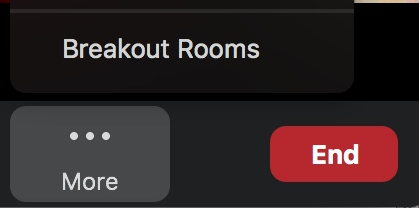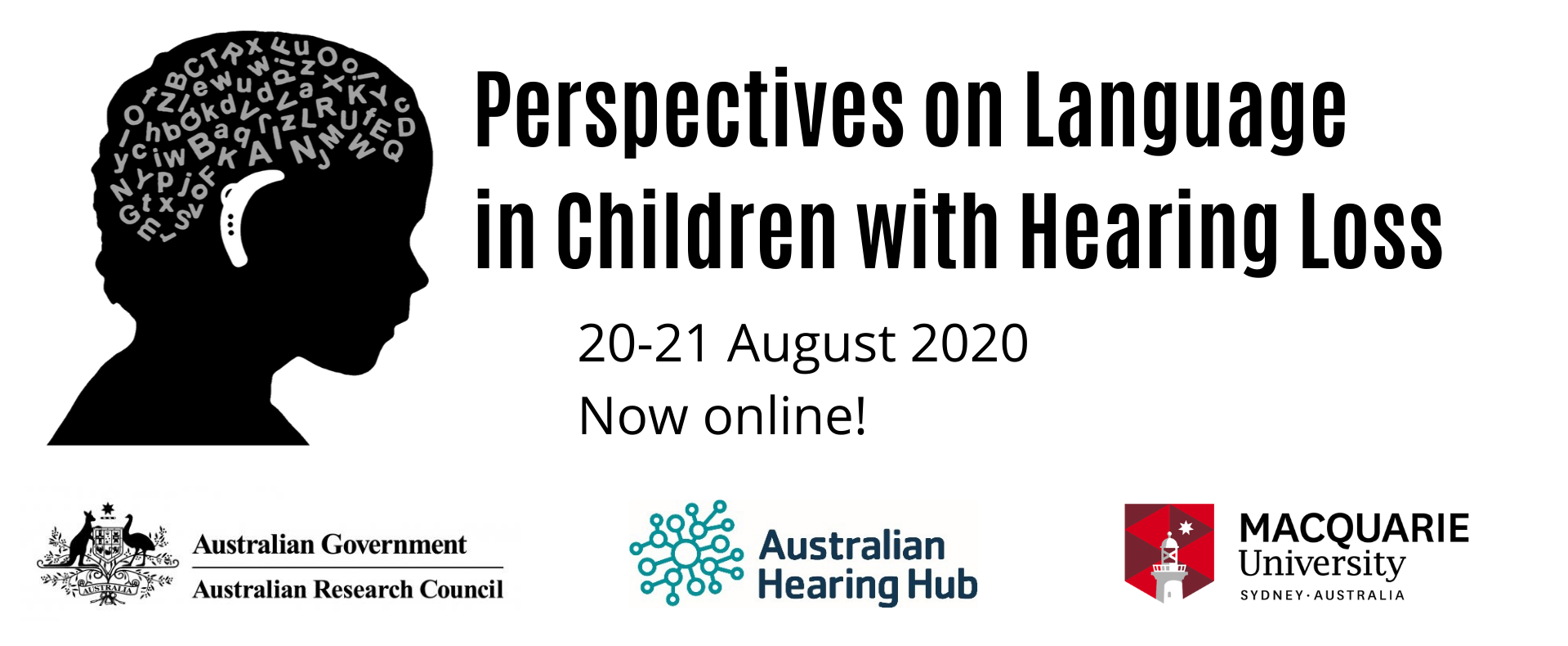Workshop August 2020
Register online now
This free workshop will now be online but we will still need participants to register. More details can be found below and you can register online now. The live-streaming link will be sent to all registered participants.
For participants in time-zones that would make live-streaming difficult, the talks will be available at the same link for two weeks after the event. We will also email you a reminder.
Live Auslan sign language interpreters will be online for all sessions and closed captioning options will also be available.
Program inquiries: Titia Benders
General inquiries: Elsa Whelan
Information about the workshop
How do children with hearing loss develop spoken language? As advancements in early identification, devices, fitting and intervention progress, children with hearing loss have better possibilities for functional language use than ever before. Yet challenges remain. This workshop brings together researchers, clinicians, health practitioners and industry representatives from diverse fields to discuss the many perspectives on how children with hearing loss come to be able to acquire and process spoken language. Many of the keynote speakers are members of the Australian Hearing Hub, an initiative of Macquarie University that brings together some of the country's leading hearing and healthcare orgnaisations and researchers, to collaborate across critical issues in hearing health.
Keynote Speakers
- Mary-Beth Brinson (Cochlear Ltd)
- Teresa Ching (National Acoustic Laboratories)
- Aleisha Davis (The Shepherd Centre)
- Samantha Harkus (Australian Hearing)
- Derek Houston (Ohio State University)
- Greg Leigh (Royal Institute for Deaf and Blind Children
- Christian Lorenzi (Ecole Normale Supérieure) (unfortunately Christian is no longer able to attend)
Organising Committee
- Rosanne Abrahamse
- Titia Benders
- Ben Davies
- Katherine Demuth
- Isabel O'Keeffe
- Mridula Sharma
- Elsa Whelan
Workshop Sponsors
- ARC Laureate Fellowship FL13010014 (Demuth)
- Macquarie University Child Language Lab
- Macquarie University Centre for Language Sciences (CLaS)
Program
The program is below or can be downloaded as a PDF (please note this program was amended on 18 August).
Thursday 20 August
| 9.00-9.20 | Registration/Virtual Foyer via Zoom |
| 9.20-9.30 | Short Welcome - Katherine Demuth Welcome to country - orated by Aunty Julie Janson Welcome - Professor Patrick McNeil (Executive Dean of the Faculty of Medicine, Health and Human Sciences) Introduction to the Workshop - Katherine Demuth |
| 9.30-10.30am | Keynote presentation I: Greg Leigh, Teresa Ching - RIDBC, NAL (Session Chair: Linda Cupples) The changing landscape of language outcomes for deaf and hard of hearing children: The view from 2020. |
| 10.30-10.45 | Tea break |
| 10.45-11.15 | Mridula Sharma - Macquarie University (Session Chair: Isabel O'Keeffe) Does dichotic listening predict phonological awareness in Australian Aboriginal children from the Northern Territory? |
| 11.15-12.15 | Keynote presentation II: Sam Harkus - Hearing Australia Responding to challenges in early identification and remediation of hearing loss in Aboriginal & Torres Strait Islander children. |
| 12.15-12.45 | Lunch |
| 12.45-13.45 | Keynote presentation III: Mary-Beth Brinson - Cochlear (Session Chair: Nan Xu Rattanasone) Impact of hearing loss and treatment options in Asia |
| 13.45-14.00 | Tea break |
| 14.00-14.30 | Laura Machart - CNRS, Grenoble (Session Chair: Rosanne Abrahamse) Influence of French cued speech on speech production in chilren with cochlear implants |
| 14.30-15.00 | Julien Millasseau - Macquarie University Acoustic cues to coda voicing contrasts in children with hearing loss |
| 15.00-15.30 | 3-minute Poster Presentations |
| 15.30-16.30 | Q&A with Poster Presenters (breakout rooms with presenters in Zoom, see Zoom link in email). |
Friday 21 August
| 8.45-9.00 | Login to sessions/Virtual foyer via Zoom |
| 9.00-10.00 | Keynote presentation V: Derek Houston - Ohio State University (Session Chair: Titia Benders) Qualities of parent-child interactions with paediatric hearing loss and the potential impact on word learning |
| 10.00-10.15 | Tea break |
| 10.15-10.45 | Christina Blomquist - University of Maryland (Session Chair: Titia Benders) Semantic prediction in sentence processing by children with cochlear implants |
| 10.45-11.15 | Rebecca Holt - Macquarie University Audio-visual speech processing in children with hearing loss |
| 11.15-11.45 | Andrea Salins - Macquarie University Orthographic facilitation of spoken word learning in children with hearing loss |
| 11.45-12.00 | Tea break |
| 12.00-12.30 | Irena Lovcevic - MARCS (Institute for Brain, Behaviour and Development) (Session Chair: Jae Hyun-Kim) Acoustic features of infant-directed speech to infants with hearing loss |
| 12.30-13.00 | Inge Kaltenbrunn - RIDBC Assessing spoken language processing in babies at 12 months after cochlear implantation: Is a single assessment procedure enough? |
| 13.00-13.30 | Lunch |
| 13.30-14.30 | Keynote presentation VI: Aleisha Davis - The Shepherd Centre (Session Chair: Jae Hyun-Kim) Clinical observations of speech, language and literacy acquisition patterns for children with hearing loss |
| 14.30-14.45 | Tea break |
| 14.45-15.15 | Voices of young people with hearing loss - discussion with Rebecca Stewart and students from Hear For You. |
| 15.15-15.30 | Closing remarks - Katherine Demuth |
Information and FAQs for attendees
Please register online and more information will be emailed to you, including the live-stream YouTube link and the Zoom link for the 'virtual foyer', a place to discuss with speakers and where the poster sessions will take place.
Where can I watch the live-streamed talks (or watch them after the scheduled times)?
A link will be emailed to all workshop registrants 48 hours before the workshop. You can also follow this link to view the live-streamed talks.
How can I ask questions of the presenter to answer in their question time?
- Use YouTube chat (you will need to set up a Google or YouTube account).
- Please only use the YouTube chat to ask questions, please don’t not use it for saying ‘hello’ etc., comments and questions will be moderated.
- OR you can send questions to the generic workshop email address (HLPerspectives@mq.edu.au) this will also be emailed to you 48 hours before the workshop).
- The chair will choose questions, so please be aware your questions may or may not be answered (it will depend on the time available and the number of questions).
- Remember that you can ask also ask questions of presenters in the ‘Zoom foyer’ during breaks, the links for the Zoom foyer will be emailed to you 48 hours before the workshop (see FAQ below).
How can I ask questions of speakers or have discussions with other workshop attendees during the breaks?
- All workshop registrants will be emailed a link for the ‘Zoom foyer’ (you can also link this to contact a workshop representative if you are having any issues or have questions).
- Please use this link during tea breaks for informal discussion.
- After being let in from the ‘waiting room’ you will be placed into a breakout room called 'info desk' where you can ask questions of a workshop representative.
- If you are logged into your Zoom account and are on a computer, you will be able to see who is in the other breakout rooms and move there to talk to them (NB. this will not be possible on a phone or a tablet, but you will be able to request to go to particular Zoom breakout rooms).
- Look for the 'Breakout Rooms' logo (which may be under 'More' if your screen is not maximised)


- Please be aware that any workshop registrant will be able to go in and out of the virtual Zoom ‘rooms’, so if you want to have a more private conversations with workshop attendees you know, we encourage you to set up your own Zoom meetings.
- We encourage you to sign up for a Zoom account and download the Zoom Client for Meetings/update to the latest version to use on your computer.
- See more information about Zoom breakout rooms here or ask the Workshop representatives in the Zoom foyer.
Content owner: Department of Linguistics Last updated: 07 Mar 2025 2:49pm

